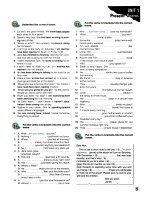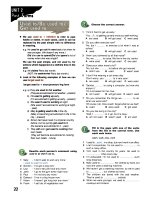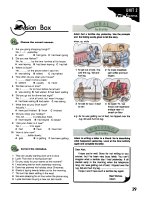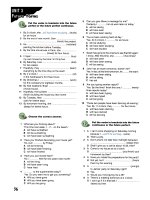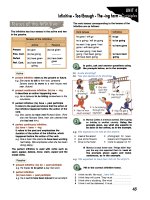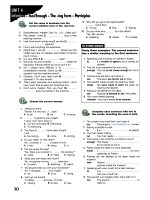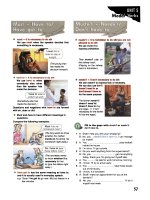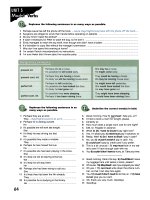Grammar three Jennifer Seidl
Bạn đang xem bản rút gọn của tài liệu. Xem và tải ngay bản đầy đủ của tài liệu tại đây (15.4 MB, 126 trang )
(continued
on
back cover)
Long
forms
Short forms
Present simple
of be
I"-
you are
he
is
she
is
*."*"
you are
they are
Present
simple
I like
you like
he likes
she
likes
it likes
we like
you Iike
they like
Present
continuous
I
am working
i;,;.,
:,
,
you
are
working''^
he is
working
she is working
it is working
we
are working
you:rre
working
they
are
working
Past
simple
of be
I
was
you were
he
was
she was
rI wils
we
were
you
were
they
were
I am not
you
are not
he
is not
she is not
it is not
we
are
not
you
are not
they are
not
I
do not
like
you do
not like
he
does not
like
she does
not like
it
does
not like
we
do
not like
you
do not
like
they
do not like
I am
not working
you
are not
working
he is
not
working
she is
not working
it is not
working
we
are not
working
you
are
not
working
they
are not
working
I
was
not
you were
not
he
*as not
she was
not
lt was
not
we
were
not
you
were not
they were
not
I was
not
working
you
were
not
working
he
was not
working
she was
not
working
itwas
noiwbrking
wewere
notworking
you
were
not
working
thev were
not
working
Itm
youtre
he's
she's
it's
we're
you're
they're
I'm working
you're
working
he's
working
she's working
it's working
we're
working
you're working
the1"1g working
I'm not
you
aten't
he
isn't
she isn't
it isn't
we
aren't
you aren't
they aren't
I
don't like
you
don't like
he
doesn't
like
she doesn't
like
it
doesn't
like
we don't
like
you
don't like
thev
don't like
I'm not
working
you
aren't working
he isn't working
she isn't
working
it isn't
working
we
aren't
working
you aren't
working
they aren't working
I
wasn't
you weren't
he wasn't
she
wasn't
it wasn't
we
weren't
you weren't
they weren't
didn't
help
didn't
go
I wasn't
working
you weren't
working
he wasn't
working
she wasn't
working
it wasn't
working
we weren't
working
you weren't
working
they weren't working
am
I?
are
you?
is
he?
is
she?
is
it?
are we?
are you?
are
they?
do
I like?
do you
like?
does
he like?
does
she like?
does
it like?
do we like?
do
you like
do they
like?
arn
I
working?
:rre
vou
working?
is he
working?
is
she
working?
is itworking?
are
we working?
are yori working?
are
they working?
was I?
were
you?
was
he?
was
she?
was it?
were
we?
were you?
were
they?
did.
.
. help?
-
did go?
was
I working?
were
you
working?
was
he working?
was
she
working?
was
it
working?
were
we working?
were
you
working?
were
they
working?
Past
simple
of regular
verbs
helped
did not
help
Past
simple
of irregular
verbs
went
did not
go
Past
continuous
I
was
working
you
were
working
he
was
working
shewasworkinS
="-
-
it was
working
we
were
workjng
you
were
working
they
were
working
Questions
I
Are you
running
away,?
2
Who
inventedjeans?
3
We've
repaired
the car
4 Have
)/ou
seen Ben?
5 Horv
much
do
you want?
6
FIe's good at drawing
7
Could
vou
help
us?
8 She
lets Ben
do an,vthing
I The film had
almost
finished
l0 I've
bought
you
a
preserlt
11
She said that I
was
lying
12
You needn't
learn
13
It
must
be
ajoke
L4 They
are
both from
Liverpool
If I
had
more
money
. .
.
The
photo I
like
best
It
needs
cutting
Fage
Present
simple or
present
continuous?
4
Past
simple or past continuous?
8
Present
perfect simple or present
perfect
72
continuous?
Present
perfect simple or past simple?
Questions
ing
form;
so/neither
do
I
etc.
would,
could
for requests;
Uncountable
nouns
let, make;
Indirect speech
(present)
Past perfect
simple;
Past
perfect
continuous
Verbs
with
two
objects;
Time
clauses
Indirect
speech in the past
mustn't, needn't;
had better, would
rather
must,
can't
for
deductions;
so, such
both,
neither;
all,
none
Conditional
sentences
type
2
Relative
clauses
need./want
+ ing;
have
/
get
some thing
done
16
20
21
28
32
36
{:
{5
5i)
il
f,Ei'
ffi
Eb
il
l5
16
r7
I
I
-l
)
I
I
-1
I
I
I
)
t-
I
I
I
I
18
Nick told
Ben .
. .
19
You
ought to turn
it down
20
I
wish
mv nose was
shorter
Has the thief been
found?
The
plane
is being
repaired
I want to be
a doctor
If
you
hadn't .
. .
25
Play it
more
slowly
Do
you
want to go
?
They won't
have
finished
28
Going
to Cornwall
Indirect
questiohs;
Indirect commands
and requests
ought
to,
should;
Phrasal verbs
Question
tags;wish + past
simple;
Plural nouns
The passive:
simple forms
The passive:
continuous
and
infinitive
forms
Verbs
with to
+
infinitive
Conditional sentences type 3;
may, might for
possibility
Comparison of adverbs;
wish
+
past
perfect
Verbs with to
+
infinitive
or
ing form
Future perfect simple and continuous;
Present simple
for future
time
Tense
review
Fage
74
.96
100
t04
116
78
82
86
92
2L
22
23
24
108
t12
26
27
Present
simple
JENNv
What's
wrong?
Are you running
awav from
something?
JANE
Yes, a
horrible green
lizard
on a skateboard
is
chasing
me.
JENNv
That
isn't
alizard.
That's
Trig,
an alien from
Triglon. He's
very
friendly.
JANE
I
don't
care
who he is,
I
don't like
him.
I
don't
usually
talk
to
aliens.
Merton is
a
verv
strange
town.
JENNY
Arevounewhere?
JANE
Yes.
I live in
Kingsley,
but my brother
Ben
and
I
are
stayingwith
myAunt
Sarah
and mv
cousin Mike
for afew
months. I
haven't
got any
friends
here.
JENNv
Well, f'm
going
to the
cinema
with mv
brother
tonight.
Do
you
want
to come?
JANE
Yes,
thanks.
I
love films
.
. .
But is Trig
coming?
Grarrmar
lesson
Present
simple
We use the
present
simple
r,
for
things that repeatedly
happen
(or
don't happen)
especially
with
ahva;rs,
often, usually,
sometimes,
never,
every
day
etc.:
s
for
things
and facts
which do
not
usually
change:
r
with verbs
such
as like,love,
hate,
dislike,
know,
believe,
think:
or
present
continuous?
I
I
I
r
Present
continuous
We
use the present
continuous
r
for
something
that is happening
at the
moment
of speaking,
often
with
now,
at
the moment,
today
etc.:
Are
you runnhtg
awq
from
something?
r
for
something
that
is happening
for
a
limited
time in
the present:
r
to talk
about future plans,
often
with
time
expressions
such as nextweek,
on
Tuesday,
fqnighf;
Is Tiig coming?
t
r
f_
t
t
t
r_
t
t
li
&
Ll.
\ t^
-
-Yi
l{
'j
:-l i:-
:
:
Fit the
he/she/itforms
of
these
verbs in
the
present simple
into the puzzle.
do be
begin
hurry have
mix
y'
Fit the ing
forms of
these
verbs into the ptzzle.
forget choose
y'
hit
rhake
happen
,"
t'] : _i
^t
t: : ::,:l
J,'
Debbie
Foster is
returning to Nlerton.
She
has
won
an Olmpic medal
for
swimming. What's
happening?
Use
the
verbs
from the
box in
the
present
condnuous
to complete the sentences.
come v get out
enter
stop
ry
ride
shake stand
wave
Now the car
t^
CoTnLn4
round
the corner.
Tlvo policemen on
motor bikes
in
front of the car.
lie
A policeman
traffic.
Some people
Now Debbie
The
IVIavor
lvith her.
Now Debbie
hall.
7
Jenny
and
Nick
what's happening.
8
Trig
the
flags.
4
5
of
the car.
hands
the
town
on
Nick's
shoulders.
Chapter
I
[o
see
3
Do you
watch too much
television?
These
people
were
asked
if
theywatched
too
much
television. Here are
their answers.
Yes, I
think I do. I'm
a
cartoon fan. I never
miss
a single
one. I
spend three
or
four
hours
a day
in
front
of
the TV.
Say if
these
sentences
are true
or
false.
Correct
the false statements.
True.
Fake.
She doesn't uatch
gamz
shows.
I
Dave
likes video
clips.
2
Marion watches
TV for
three
or four
hours aday.
Jill
plays the piano.
Max
never misses
a single
cartoon.
Jill
does
her
homework
in
the
evenings.
Marion
reads
the TVguide
from
cover to
cover.
Dave
watches
TV for
an
hour
a
day.
Max
hates
cartoons.
Jill
phones her
friends when
she
comes home from
school.
Dave
spends five hours
a
day in
front
of the TV.
Max
watches
TV for
an hour
a
day.
Dave
always knou's
what's
on TV.
Marion
likes video
clips.
Dave
hates
game shows.
Max
thinks that he warches
too
much
TV.
o
J
4
5
6
I
I
/
t_
L
L
r_
MAX
MARION
DAVE
No,
I don't.I have
other things
to do.
I
play
the piano and
read. I
watch nature
programmes,
but
I
don't usually know
rvhat's
on TV.
I
don't think that I
rvatch
too much TV.l
rvatch
for
about an
hour
a
day.
I like video
clips
but
I
think game
shows are
stupid. I read
the TV guide
from
cover
to cover, so I
always knowwhat's
on.
Yes,
I
do.
As
soon
as
I
come home from
school I turn
on the
TV. I
sometimes watch
for about five hours
a
day. My Mum
doesn't
say
anything.
I
do mj,
homework in
the
mornings when
I'm
fresh.
Work
with
a
partner.
fuk and
answer
five
questions
with
do
or does.
Give
short answers.
PARTNER
No, he
doesn't.
telnision?
PARTNER
Yes,
they
do.
Write
your
own opinion
in
a short
paragraph.
Do you watch
too much
television?
What
do
you
like?
What
don'r you
like?
n
I
8
9
10
11
I2
13
14
l5
t_
I
I don't watch too
much
Chapter
I
J
I
J
l
i
J
I
I
-
-!
De:ec:i*t:s l:',r-:i
Tom and Nick are watching the house across
the
street.
Something
strange is happening.
Put
the verbs
in
brackets in the present
simple
or the
present continuous to
make
correct sentences.
roM
\Mhat
> arc
yow
,ltatvg
(you
stare) at?
NrcK
There's a
man
at
theJohnsons' house. He
>
d^oeA'rit he
(not
live)
there.
I wonder
what he
l
(do).
roM Perhaps he
(visit)
theJohnsons.
NrcK
No.
Thev're not at home.
Thev
both
I
(work)
in
town.
They
1
(catch)
the
same
train as
Dad every
morning. It's
strange. He
(look)
at
the
house
very
carefully.
Tor{
Norv
he
(try)
to open the
gate, but
it's
iocked. Lookl
He
(climb)
over the
garden
rvall.
I can't see
him now.
Let's follow him. I want to see
what he
/
l
(do).
NICK
TO}I
}IAN
He
t0
window!
NrcK
He
must
be a
burglar
. .
.
l2
(go)
to the garage.
He
(carrv)
a
ladder.
Norv he
(put)
the ladder
up
to
the bedroom
Hev!
You! What
mage
to
(know)
I1
It'
IJ
(you
do)?
s all
right,
boys.
I'm
an
insurance
agent.
I
(examine)
the storm
da
the
roof. TheJohnsons
that
I'm here.
t4
nn
I ]
IJ
,
.t
I I
EItJ
Chapter
I
2
Who
invented
jeans?
Past
simple
or
past continuous?
t
t
t
t
t
t
t
ToM
You've
got mud
on
yourjeans.
NrcK So what? The
prospectors'
jeans
were
,
much
dirtier.
roM You mean
during the
Californian
Gold
Rush? Did
theywearjeans
then?
NrcK
They say
that
the prospectors
were
the
first
people
to wear
jeans.
They
didn't
wear
their best
clothes
to look for
gold,
you know.
ToM
Who
inventedjeans?
NrcK
Levi
Strauss made
the first
pair ofjeans
in America
in 1850.
He
was
a tailor. He
was
travelling from
New York
to
San
Francisco,
when
he
met
some men who
were
digging for
gold in
a cold, muddy
riverand
Grammar
lesson
Past
simple
We form
the
past simple
with
ed or d for
regular
verbs.
invent -r
invented
live
+
lived
Irregular
verbs have
a special
form.
Look
at
the
list
at the
back
of the
book.
wear
-+
WOre meet
+
met
We
use
did + infinitive
without
to for
questions,
and did not
or didn't +
infinitive
without
to
for
the negative.
ThE
didn't
wear their
best clothes.
We use
the past simple for
an
action
that
started
and finished
in
the past,
often with
a
time
expression.
Past
continuous
We form
the past
continuous
with
wasr/were
+
an ing form.
We
make questions
and negative
forms
like
this:
He
uas not
(on
utam't)
trauelling
to Nan
York.
We
use the
past continuous
for
an
action
that
was
already happening
at a particular
time
in
the
past.
Past
simple or
past
continuous?
\Arhen
one
action
interrupts
another,
we
use
the
past continuous
and
the past
simple
together in
one sentence.
We use
ihe
past
continuous
(was
travelling)
for
the
longer
a-ction
and the
past simple
(met)
for
the shbrter'interrupting'
action.
Francisco
when
he met
some mzn.
L
t
r
-
T
r
L
t_
2:
(
<?
\
t
a.K
EN
RE
FW
AV
NO
OU
RO
G
K
F
B
j
J
a.
Ho*
-u.ruv'erbs
in the past simple can
you
find?
Are there
fourteen,
sixteen or eighteen?
CAME
xco
T}IR
zsA
ERE
EEA
\,VAT
NDK
UGH
VIEV
LTNA,
Y KW
xGo
J
AR
ooK
xxE
TZD
SE
EN
TX
BV
KW
RA
ID
EX
TZ
xz
EH
AS
NZ
KW
'l
il:
-,v3::
:jl:';
C:a:llf,'
Jennv
went to u
0u.,
When
Jl. arriu.d,
this is what she satr'.
I
I
-\
'
/
I\,
J-,
-\
\,\brk
with a partner. Study
the picture
for
one minttte,
then cover
it. Take turns
to
read the questions and
give answers using
the past
continuous.
or a girl?
A girl uas standing
near the uindou.
What was the
girl
near the window
doing?
How many people
were standing
near,the
food?
What was the
girl
in the corner doing?
<>
lVhatwas
the girl in
the cornerwearing?
How many
people
were
dancing?
Was anybody
sitting on
the
floor?
How many
people were playing
cards?
Was anybody
sleeping?
lVho
was singing? A
boy
or
a girl?
Was
anybody drinking cola?
I
2
4
5
6
7
8
9
t0
3
Howjeans
came
to
America
Put
the
verbs
in
brackets
in
the
past simple
or
Past
continuous.
L
L
L
L
L
L
L
L
:
-
L
L
L
L-
r
I
ll
l4
l8
20
l3
16
t7
Levi
Strauss
>
U.m.&
of Germany.
When
he
I
But the
mayor and
Levi's
parents
them
to
marry.
Levi's
parents 1
his brothers
5
tailors
and
they
In 1850.
Levi
9
to San
Francisco when
he
l0
weather was bad.
It
t2
Suddenly
Levi
15
The men
l9
Strauss
91
in France.
That's
howjeans
3
(come)
from a
small town
in the south
(fall)
in love with
(be)
ayoung man,
he
the
mayor's
daughter.
(notwant)
(send)
him away to NewYorkwhere
(live).
They
(be)
(teach)
him
to
sew.
(take)
somesailcloth
from NewYork
(meet)
some
men.
They
(dig)
for
gold in the streams and
rivers.
The
(rain)
and the wind
(blow).
The men were cold
because they
(wear)
only thin
trousers.
(have)
an
idea. He
(use)
the sailcloth
which he
(transport)
to
make
Eousers
for
the
men.
Then he
(sew)
on
metal studs
to
make them
stronger.
(love)
the trousers but
they
(not
like) the
yellow-grey colour. So
when Levi
(open)
a tailor's
shop
in
San
Francisco, he
(import)
a special
thick blue
material from Nimes
(become)
blue.
Chapter
2
I
A
'a
a
a
I
His
parents sent him to
America.
(Where)
2
His
brothers taught him to sew.
(What)
and it
l
3 In
1850
he set
out
for San
Francisco.
(When)
When
I
?
who
1
4 He met
some prospectors
on the way.
(\Mho)
He1
direction.
Suddenly,I
I
5
They were
digging
in a river.
(\Ahere)
Where did he
come
from?
Use the
words in
brackets to
write
questions
about
Levi
Strauss.
Whe,r<.
d+d
h,e
au*-
fwn?
6 They were
wearing thin trousers.
(What)
7 FIe
was
taking
sailcloth
to California.
(What)
He made
trousers
from the sailcloth.
(What.
. .
from)
I
The men
didn't like the colour.
(\,Vhv)
He imported
blue
material from France.
(Where.
. . from)
Read
aboutJane's frightening
experience.
Put
the
verbs
in
brackets in
the past
simple
o:' the past continuous.
Ptc'1.
e A Ingnt
I
-
4
4
J
t
t
t
{
J
J
J
J
I
I
1>
Uu'!h'L
(catch)
the nine
o'clock
bus
home
last nieht.
11>
urtuJ
(get)
dark
(rain)
hard
as
well.
(get
off)
the bus,
there was no
one
in
the street,
onlv an
old man
(take)
his
dog for
a
walk.
(walk)
in
the
opposite
(hear)
footsteps
behind
but the
nearer.
faster,
a
fright.
I finally
just
as I
me.
I9
tr7
(begin)
to
run
(come)
nearer
and
(run)
faster
and
(reach)
home,
but
(put)
the key
in
the
(feel)
a
hand
on
my
I9
(shake)
with
door,I
t2
shoulder.
A
man's voice
t3
(sav),
'Excuse
me Miss,
here's
your
umbrella. You
l4
(leave)
it
on the
bus.'
Think of
an experience
or a situation
which
frightened
you.
Write a short paragraph
about
it. Include
where
you were, what you
were
doing and
what suddenly happened.
Read
your story
to the
class.
ndI9
10
ll
l-J
I
10
Chapter
2
3
We'\'e
repaired
the
car
presenr
perfect simple or
present
perfect continuous?
JENNv
Nick,
you're
covered
with
oil.
What
have
you been
doing?
NrcK
Well,Jane's
cousin
Mike
has bought
an
old car,
and
it has
been
making
strange
noises,
so we have
been
helping
him to
repair it.Jane
and I
have
been working
on it for
hours.
We'vejust
finished.
We've
cleaned
all the
parts.
The
engine
looks
like new.
JENNv
But Nick,
you
have
never
repaired
a car
before.
. .
);rcK
It's easl'.
And look,
I've found
all these
extra
screl\rs.
t_.t
t__.|
-r
L
t-
r
I
-
-
i
L
L
L
L
r
Grammar
lesson
Present
perfect
simple
Form
have
or has
+
past participle
Look
at the back
of the
book for
a list
of
irregular
verbs
and
their
past participles.
Use
We use
the present
perfect
simple
u
for
a completed
action
with
just,
already
and
yet:
E
for
a completed
action
which
has an
effect
or
result
in
the present:
(result:
The
engine looks
like
new.)
z,
for a
completed
action
at
an unknown
or
unstated time,
often
with
ever and never:
Present
perfect continuous
Form.
have
been
or
has
been + ing
he has
bem working
Use
We
use the
present perfect
continuous
r
for
an action
that
begins in
the past
and
continues
up to the present.
The
action
may
be
finished
or unfinished:
r
with for and
since
and how
long
to
emphasize how
long
an
action has
been
happening:
-
r
often
with
the long
acrion verbs
play,
learn,
do, wait,
live, rain,
work,
sleep
etc.:
lLl
"'
Chapter
3
I
t_
I
I_
I
I
I
I
I
I
J
I
I
R-ng t-ne
past
participles
How many past participles can
you find? Be
careful! Some
words
are in the
past simple
form.
KXDRAw'NS
NZJUTRST
OZENEIPO
WUilIYZTOL
NTRANTKE
a.wASSEEN
DRTVENNa.
NXGONEa.Z
Round the
class,
say
the infinitive, past
simple
and past
participle
forms
of the
verbs
you
have
found.
past
simple
past participle
uas been
LS
ow
WA
N IVl
TA
FE
SH
Azq
TFR
EXS
NWE
KEN
LLA,
AKE
infinitive
I
I
2 The race
a
I Driver 3
has fallen out.
2
Car 7 has
lost its steering
wheel.
3 Cars
I
and
3
have
crashed.
4
Car
I has lost a wheel.
5 Driver I has fallen
into
the
water.
6
Car
7 has got stuck in the
mud.
7 Driver 4 has driven into a tree.
8
Car 3
has
a
flat tyre.
9 Car I has overturned.
l0
Car
4 has won
I
I
i
I
I
J
Ia
I
I
I
I
I
J
I
J
I
t
!
Look at
rvhat has happened
in
the
race. Read
the sentences and
put a
y'
to
show if they are true
or
false.
True
False
MT
NM
NT
nx
NT
!n
!T
NT
nn
NT
!n
ntr
Work with a partner.
Ask and answer four
questions about the
race.
PARTNER No, he hasn't.
pARTNER
Cars
I and 7 haue
lost zuheek.
S^<-X
Chapter
3
L
L
3
a
Activities
Write
new
sentences
using the present
continuous
with
for.
Ja'n*-
/'n"t
bzLt+
ta*rng
tauit
tn
!.?/3.t4141 to7-
U?ZrS.
1
Jenny
plays the piano.
She started
in
1988.
Tom collects football posters. He
started
in
1987.
3
Nick goes
to a
youth
club. He
started in 1990.
4 Paul draws cartoons. He
started
in
1989.
5
Jane
collecs
old bottles. She started
in 1988.
Tom plays
football for
the
school team. He
started
in
1989.
Pam
takes
riding
lessons.
She started
in
1991r
t__
l_
Marion writes
to
a pen-friend in Athens.
She
11
Jill
goes to
karate lessons.
She started in
12
Ann writes poems.
She started
in
1990.
b Say
the
answers to
(a)
with
since.
Jane
has been takingtennis
hssons since 1991.
D
started in 1989.
I
-
10 Peter works in
a
supermarket
on
Saturdayr.
L
He started
in
1992.
re87r
f
t
4 I have been
collecting . .
.
On
a piece of paper,
write
a
sentence
about a
hobby or sport thatyou do regularly.
Use
the
present perfect continuous with for
or
since
to
say how
long you have
been doing it.
Do not
write
your
name
on
the
paper.
-
The
teacherwill collect all the papers
"ia
giu.
them
to different students.
Take
turns to guess whose paper you have
gol
f
Continue
until
you
have found
the right
person.
l-
I
lv,ue
bet
L
@V
fufl'htf
lah'*
f*
tun
gurt.
hetchup
labek
fm
two years?
GEoRGE
Yes, I
haae.
oR
No, I haam't.
L
L
Chapter 3
a
I
a
I
t
_'
I
J
I
4
I
l
I
-,
-i
{
I
I
I
+-
I
I
J
J
J
J
J
j
J
.J
t
,
3
4
J
6
4
t
8
9
10
3
a
14hat
have th"y been doing?
Complete
the sentences
with
the present perfect simple
or the present perfect continuous.
magazine.
She hasn't
finished ityet.
I Ben
(look)
for his pen-knife,
but
he hasn't
found
it
yet.
Jenny
(wait)
for
the bus for half
an
hour,
but
it hasn't arrived
yet.
Nick
(play)
a computer game
for
two hours and
he's
still
playing.
Mike hasn't
finished painting his
car yet. He
(work)
on
it
for
two
weeks.
Amanda
(not
come)
home yet.
She has been shopping
in
town since
l0
o'clock.
Mike's car
(make)
strange
noises.
Nick andJane
have
cleaned all the parts.
Ben'has been
drawing
cartoons
for
two hours. He
(not
finished) yet.
Amanda has
been
waiting
forJenny in
town.Jenny
(not
arrive)
yet.
Jane.
has
been
knitting a
pullover.
She
fiust
finish)
it.
Tt
J\
\^5=r
\J
4Fo
II
t2
(rain)
all
day and
it hasn't
stopped yet.
Mr Blake has been
marking tests all evening
but
he
(not
find) a perfect
one
yet.
Trig
(practise)
the present
perfect, but he
hasn't
got
it right.
Think
of ajob
or
activity that you
have
started but have
not finished,
for example, something that
you
are
making, reading
or drawing.
Write
a
short
paragraph
about it. Say how long
you have
been doing
it.
c3>
+
I have
got
it right!
l'"r
lc.n
iT{"b
o"
4r
Chapter
3
you
seen
the film?
Cross
out
the wrong
verb
forms.
Yesterday
Nick
>
metltMet
Paul and Ben
on
his
way
to school.
'Metal
Man Strihes Bach is on
at the cinema.
I Have
you
seen/Did
you
see
it?'
2
has
asked/asked Nick.
'No.I
3 haven't gone/didn't go
to the cinema
for months.'
4 answered/has
answered Paul.'I 5
haven't been/wasn't
since
my
birthday.'
'But
I
6
saw/have
seen
Metal Man
Strih.es
Bach II
and
TheFly's Reuenge,'
7 said/has said 8 have seen/saw
them
last
week
in Bristol.
My
Ben.'I
cousin's
friend t
has
given,/gave us
two
special passes.
We
saw eight
films
in
two days,'
10
has
explained/explained Ben.
'But
I can't
remember
any of them.'
]
l
q::?
r
I
4 Haveyouever ?
Practise making
dialogues with
your
partner by using
the
information in
the table.
Then
fill
in
the empty
part of the table with your
own
ideas and make new
dialogues
with your partner.
Haue you aner been to Spain?
PARTNER Yes. I haue.
When
did you
go there?
PARTNER I
went there tuo
years
ago.
What/Whne
Whm
YOU
go
see
watch
read
hear
What/TVhere
When
to
Spa/r-
frfuToatr ol Lond"ot+
thz
h,b.u
Sl'lnu)
frz,nkpn*Ain
tuo
qeart
a:qo
w
tqql
Larfr
ftislt,
-
two
tytotbl-u
aAo
-
hrt hreek
a. ru^il,b
platt
-
Chapter
4
How
much
do
you
want?
Questions
I
-J
_l
_l
f.
NrcK Can you
lend me
some money
until the
weekend?
ToM Have you spentyour
pocket money
already? How much
do
you
want?
NrcK Howmuchhaveyou
got?
ToM Not much.
Do
you
need
more
than a
pound?
NrcK flaven't
you
got
more
than
that?
roM
No.
Sorry. I had to
buy a new
light
for my
bike
yesterday.
Why
don't you ask
someone
else?
NrcK
Why
did you
need
a
new light?
What
happened?
roM
Someone knocked my
bike over and
broke the front light.
NrcK
Who
knocked
it
over? Why didn't
they pay
for it?
roM
I don't know.I
didn't see who
did
it.
Grammar
lesson
Questions
1
In yes/no questions the auxiliaryverb
comes first. The subject
comes next,
then
the
verb.
Compare:
(Who
is
the subject.)
Who
did Nich
see?
(Nick
is
the subject.
Who
is
the object.)
To make a negative
question
we add n't
to
the
auxiliary verb. Negative
questions
can
express
surprise or regret.
Why didn't
thE
payforit?
With Why don't
you/we.
. . ? we
can
make suggestions.
Can you lend me money?
Yes/No.
Have you spent
it
already?
Yes/No.
Do
you need a
poundi Yes/No.
r
1
__J
Questions
which ask
for information
begin with question words:
where, when,
l
what, who, which, why,
whose, how,
how
-l
much
etc.
We
put the question
word
before the
auiiliary
u.ib.
t
How much have
you
got?
:
Why did you
need it?
If who or what is
the subject, the verb
in
the
question is
the same as it
would
be
in
'
an affi
rmative
sentence.
subject.)
What happened?
(What
is
the subjecr.)
-
If who or
what
is
the object
of the verb, r
we make
the question with
a form
of do.
-=
_r
_T
-I
J
Chapter 5
What
kind
of
person are
you?
Complete the
questions with
the correct form
of
be,
have or do. Then ask your partner
the
questions
and
put a
y'
in
the
correct
box.
ti
a
-
I
9
o
J
4
J
b
I
8
9
10
l1
r2
13
T4
I5
Arc
Do
you sometimes shy?
you
enjoy puzzles?
you sometimes day-dream?
you
ambitious?
your room
usually tidy?
you
like
getting up early in
the morning?
clothes
important
to
you?
you
serious
about sports?
being fit
important
to
you?
you
worry
when you make mistakes?
you often bored?
you cry
during sad
films?
you laugh a lot?
you ever written a poem?
you
ever get angry?
some colours
make
you feel happy?
you got a
lot
of hobbies
and
interestsi
yes
no
XM
MN
TI
nn
IN
TN
trn
TN
TN
nn
nn
ntr
tr!
nn
T!
trT
ln
-l
!
I
j
icr
JL.
iE
Who did
it?
Last Saturday
night
someone shot
the actor
Henry Farthing
at
his flat in
London. Inspector
Soames
wants to
know
the
answers
to these
questions.
Put in
the
correct
question words: who, what,
when,
where, why, how, orhowmuch.
Sometimes two answers are possible.
I
was the motive?
2
is the main
suspect?
3 information
have the police got?
4
happened on the night
of the
murder?
did Farthing
go
rvhen
he
left the
house?
did he
meet?
did
he
meet him
at six
o'clock?
saw
Farthing
last?
did the murderer
get
into
Farthing's
flat?
does
JanetJones,
his girlfriend,
know?
did Farthing
phone
her that
evening?
is
the
gun?
6
I
8
I
ll
10
t
r2
Chapter
5
3
All
about
sharks
Use
the words
in
brackets to
make
questions
about
sharks.
(How
many)
How
rnnnt
fupu
of slqn*
A,rc
tt42t9?
Sharks
live in oceans, but some live in lakes
and
rivers.
(Where)
Whzt<,
d^o
sha,ila
thn?
Sharks eat fish, seals,
crabs and sea birds -
and
sometimes
surfboards.
(What)
2
The
Whale Shark
is
the largest
shark.
(Which)
Sharks' teeth can
be
7.5
centimetres
long.
(How
long)
4 Sharks can have
3,000 teeth.
(How
many)
Sharks
find
their preywith their sense
of
smell.
(How)
The
Megamouth
sharkwas
discovered in
1983.
(When)
Millions
of sharks are killed
worldwide every
year.
(How
-*y)
8 Soup can be
made from
sharks.
(What)
In
Florida about 120,000 sharks
are killed
everyyear.
(How
many)
Fewer than 100 people are
attacked
by
sharks every
year.
(How
many)
I
!
I
m
-
t
T
T
10
!
;
D
I
?
I
F
I
rF
r
I
F
I
F
Are
there
any
sharks
in
Merton
Pond?
Chapter 5
3
a
a
!
i
I
'
a
I
I
I
I
/
I
J
I
c
ilIystery
man
Read
the m)'ster)'man's
answers
and
write
the
questions.
Then
guess who
it
is.
I
was born
in 1947.
I
was
born
in the
States.
I first
use.l a
movie camera
when I
was a boy.
I filmed
toy trains.
I started
directing
TV programmes
when I
was
21.
I made
Jaws
in 1975.
E. T was my
biggest
success.
It made
more than
700 million dollars.
I have
also directed
IndianaJones, The Color
Purple
and Hooh.
The
mystery man's name is
\!ho?
lfhat?
When?
Vlake
three quiz questions about
each
fact.
Begin
rvith
who,
what or when.
Uranus in
1781.
Wrc discoaered
Uranus?
Wen
did
Hsrschel
discoun
Urar'us?
Wat did Herschel discousr
in 1781?
When was
Uranus discouered?
1 Edison invented
the light
bulb in 1879.
2
Howard
Carter discovered
the tomb
of
Tutankhamun
in 1922.
3
Henry
Dunant founded
the
Red
Cross
in 1864.
4 Daniel Defoe
wrote
Robinson Crusoe in
1719.
Make
quiz questions about the history
of your
country. Write five
questions with who,
when,
where,
what
or how.
Ask
your
questions
round
the
class.
I
2
o
c
A
T
5
Suggestions
With a
partner,
make
suggestions with
Whydon'tyou ?
You
lt's hot in here.
PARTITER
Wy
don't
you
open a zuindow?
I'm
thirsty.
I've
got a headache.
I'm
tired.
I've
got
a lot
of
homework
to do.
I'm
hungry.
My
bicycle is dirty.
My feet
are wet.
I'm
cold.
I'm always
short of
money.
Mv
watch
is
broken.
-
1
2
o
J
4
5
6
F7
8
9
10
.a
t
b-
'aoooaoqgoogos
Chapter
5


